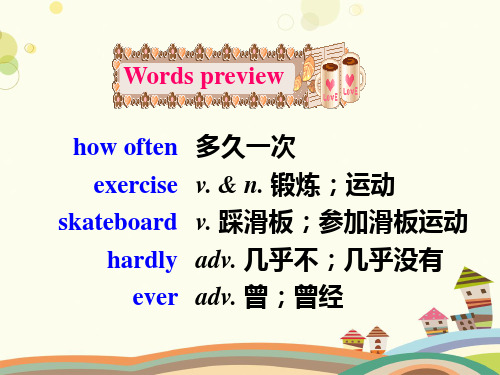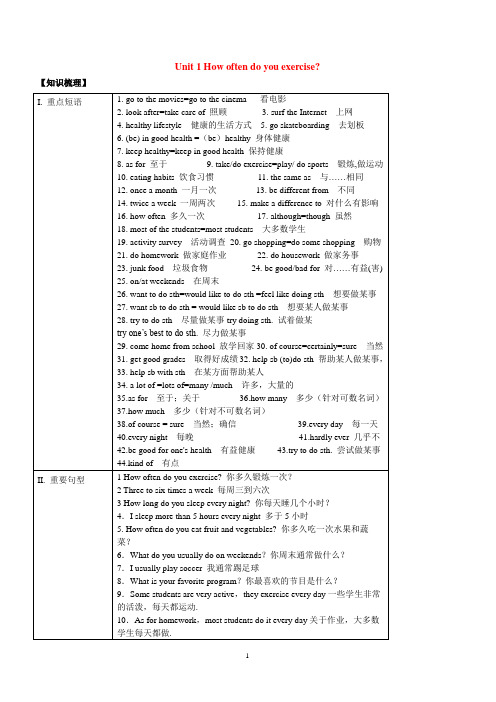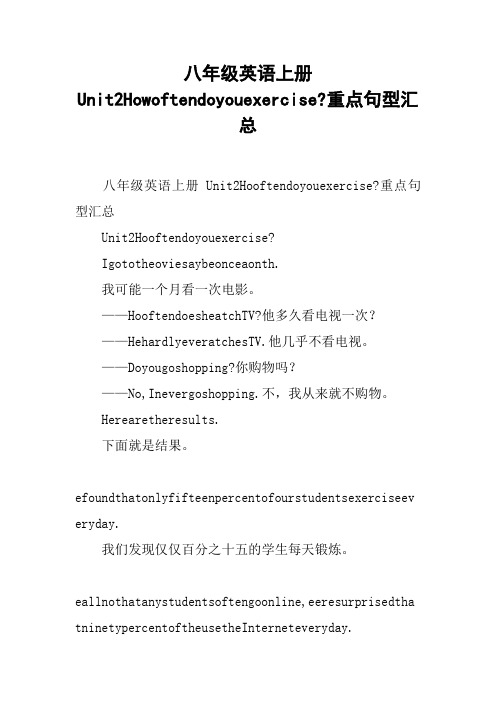新目标英语八年级上册Unit2Howoftendoyouexercise-SectionB同步测试
- 格式:docx
- 大小:40.28 KB
- 文档页数:10

Unit 2 How often do you exercise(第1课时)讲课教师:学科:English 课时:One 总课时数:教学目标知识与技能Learn some new words and how to talk about how often they do things.过程与方法Interactive teaching method.情感态度与价值观Let the students form good habits.教材分析教学重点Master the use of adverbs of frequency.教学难点Master the rules of changing countable nouns.教学过程教师活动学生活动备注(教学目的、时间分配等)Step1.Leading-in1.Good morni ng, boys and girls! Today we aregoing to learn Unit 2 How often do you exercise?2.Do you know the meaning of exercise? You are right.Exercise means do sports.S1, do you often exercise?What kind of exercise do you often do? Try to answer theteacher’squestions.Try to guess.5’教师活动学生活动备注(教学目的、时间分配等)S2, do you often exercise? Why not?Then, what do you often do on weekends?3. Look at this card. What does the girl often do on weekends?help with housework .Step2.Presentation1.Now let’s do 1a. Look at the picture. Makea list of the different we ekend activities. Do you often go shopping, girls?Wha t about boys? So you hardly ever go shopping, right?(hardly ever)2.N ow let's look at 1b.Step3.Listening1.Then we will listen to the tape and write the letters from the picture above on the lines below.2.Explain the word—timethree times a weekfour times a yearonce/twice a day3. OK. Now open your books. Look at 2a. Listen. Cheng is talking about how often he does different activities. Number the activities you hear [1-5]. 5. Now we will listen again. How often does Cheng do the activities above?Match his activities with the number of times he does them.Step4.Practice1.Talk about how often Chen Tao does the activities in pairs.2.Finish 2c in groups.Step5.SummarySum up the main knowledge.Step6.ExercisesDo some exercises. Think and guess.Listen and learn.Listen and write.Practice in pairs.Practice in pairs.Try to say out the main5’Interestthe students.6’10’3’3’5’6’2’knowledge.Step7.HomeworkBoys and girls, what do you do onweekends? Write a short passa ge about i tand about how often you do them.板书Unit 1 How often do you exercise?help with housework always usually often every dayshopping 100% 80% 30%-50%once a dayreading sometimes hardly ever never twice a weekexercising 20% 5% 0% thr ee times a monthwatching TV教学后记:。


人教新目标英语八年级上册Unit 2 How often do you exercise?词句精讲精练撰稿:审稿:词汇精讲1. maybemaybe是副词,意思是“也许,可能”,在句中作状语,相当于perhaps,常位于句首。
例如:Maybe she’ll come this afternoon. 她可能今天下午来。
Maybe you put the letter in your pockets. 大概你把信放在衣袋里了。
【拓展】(1)maybe和may be的辨析:maybe是副词,而在may be中,may是情态动词,be是动词原形,两者构成完整的谓语形式,与主语形成系表结构,意为“也许是、可能是”。
例如:I can’t find my watch. It may be in your pocket.我找不到我的手表了,它可能在你的口袋里。
He may be a soldier. 他可能是军人。
(2)maybe和may be可相互转换。
例如:He may be in the office. = Maybe he is in the office. 他或许在办公室。
You may be right. = Maybe you are right. 你或许是对的。
2. althoughalthough的意思相当于though,意为“尽管,虽然”,用来引导让步状语从句。
它所引导的从句不能与并列连词but; and; so等连用,但可以和yet; still等词连用。
例如:Although he lives alone, he doesn’t feel lonely.= He lives alone, but he doesn’t feel lonely.虽然他一个人住,但他并不感到孤独。
There is air all around us, although we cannot see it.虽然我们看不见空气,但空气却存在于我们的周围。

Unit 2 How often do you exercise?Section A 1 (1a-2d)一、教学目标:1. 语言知识目标:1) 能掌握以下单词: housework, hardly, ever, hardly ever, once, twice, Internet, program, full, swing, swing dance, maybe, least, at least能掌握以下句型:① —What does he do on weekends —He usually watches TV.② —How often do you watch TV —I watch TV every day.③ —Does he go shopping —No, he never go shopping.2) 能了解以下语法:频度副词及一般现在时简单谈论周末活动情况。
2. 情感态度价值观目标:通过本单元的学习,养成健康的饮食习惯,保证充足的睡眠时间,进行合理的运动锻炼,以保持健康的体魄。
培养学生的逻辑表述能力,激发学生的积极思维,并使学生互相了解,增进友谊,加强人际交往,以形成良好的人际关系。
二、教学重难点1. 教学重点:1) 对6个频度副词细微差异的理解及使用。
2) 弄清一般现在时在不同人称下动词形式及提问的变化。
2. 教学难点:1) 第三人称单数谓语动词在此核心句型中的运用。
2) 谈论课余时间的各项活动,以及初步认识和使用频率副词。
三、教学过程Ⅰ. Lead inTalk about your last weekend’s activities.Ⅱ. Presentation(1) 教师问:“What do you usually do on weekends ” (并且板书)让学生根据自己的实际回答I usually …… on weekends.(2) 教师出示动词卡片 watch TV,read books,exercise,swimplay football、go shopping、go to movies让学生回答。

八年级英语上册Unit 2 How often do you exercise知识点归纳八年级英语上册Unit 2 How often do you exercise知识点归纳一、词组、短语:1、help with housework 帮助做家务活,2、go shopping 购物,3、on weekends 在周末,4、how often 多久一次,5、hardly ever几乎不,6、once a week 每周一次,7、twice a month每月二次,8、go to the movies去看电影,9、every day 每天,10、use the Internet上网/用网,11、be free有空,12、have dance and piano lessons 上舞蹈钢琴课,13、swing dance摇摆舞14、play tennis 打网球,15、stay up late熬夜,16、at least至少,17、go to bed early 早睡,18、 play sports 锻炼身体,19、be good for 对…有好处,20、go camping去野营,21、in one’s free time 在某人的空闲时间,22、not….at all 根本不,23、the most popular 最流行,24、such as例如,25、go to the dentist去看牙医,26、more than 超过/多于,27、Old habits die hard.旧习惯难改。
28、 hard=difficult 困难的,29、less than 少于/不到二、重要句子(语法):What do you usually do on weekends你周末通常做什么 I always exercise.总是锻炼身体。
What do they do on weekends他们周末干什么 They often help with housework.他们经常帮助干家务活。



Unit2 How often do you exercise?一、重点短语help with housework 帮助做家务 on weekends 在周末how often 多久一次 hardly ever 几乎从不once a week 每周一次 twice a month 每月两次be free 有空 go to the movies 去看电影use the Internet 用互联网 swing dance 摇摆舞play tennis 打网球 stay up late 熬夜;睡得很晚go to bed early 早点睡觉 play sports 进行体育活动be good for 对……有好处 go camping 去野营not…at all 一点儿也不…… in one’s free time 在某人的业余时间the most popular 最受欢迎的 such as 比如;诸如old habits die hard 积习难改 go to the dentist 去看牙医more than 多于;超过 less than 少于at least 至少 have dance and piano lessons 上舞蹈课和钢琴课二、句型荟萃help sb. with sth. 帮助某人做某事How about…? ......怎么样?/ ……好不好?want sb. to do sth. 想让某人做某事How many+可数名词复数+一般疑问句?…有多少…?主+find+ that从句. ……发现……spend time with sb. 和某人一起度过时光It’s+ adj.+ to do sth. 做某事是……的。
ask sb. about sth. 向某人询问某事by doing sth. 通过做某事What’s your favorite……? 你最喜爱的…是什么?the best way to do sth. 做某事的最好方式三、单元语法频度副词1.频度副词:表示动作发生间隔(既频率)的副词。

初二英语人教新目标版八年级上册Unit 2单元测试题How often do you exercise?I.单项选择.-Can you go swimming with me next Sunday?-Sorry, next week is for me.A.freeB. goodC. enoughD. full【答案】D【解析】句意:-卜.星期天你能和我一起去游泳吗?-对不起,我卜.周的安排都满了。
A. free形容词,空闲的或免费的;B.good形容词,好的;C.enough形容词,足够的;D.full形容词,满的、饱的。
根据句意可知,此题指“事情都满了“,不能去游泳了。
应选:Do. You can buy almost everything the Internet, and it's very easy.A. intoB. forC. atD. on【答案】D【解析】句意:在网上你几乎可以买到所有东西。
而且非常简单。
A. into进入:B. for为……:C.at在某时间点或地点;D. on在上。
在网上,通过网络:on the Internet.应选D。
【考点】考查介词辨析。
2.Gina often helps her mother housework in her free time.A. inB. toC. atD. with【答案】D【解析】句意:吉娜在空闲时间经常帮妈妈做家务。
根据help sb with sth帮助某人做某事;应选D【点评】帮助某人做某事通常有三种形式,help sb do sth;例如:He helps his mother do housework. help sb to do sth例如:He helps his mother to do housework.和help sb wi th sth .例如:He helps his mother with housework.【答案】31. least32. times 33. are34.writersplaying【解析】句意:迈克一周至少打两次网球。

八年级上册英语第二单元知识点归纳Unit 2 How often do you exercise?一.词组,短语:1、help with housework2、go shopping3、on weekends4、how often5、hardly ever6、once a week7、twice a month 8、go to the movies9、every day 10、use the Internet11、be free 12、have dance and piano lessons13、swing dance 14、play tennis15、stay up late 16、at least17、go to bed early 18、play sports19、be good for 20、go camping21、in one’s free time 22、not….at all23、the most popular 24、such as25、go to the dentist 26、more than27、Old habits die hard 28、hard=difficult29、less than二.习惯用法,固定搭配:1. help sb. with sth2. How about+n./v.ing?=What about…?3. want sb. to do sth.4. How many +5. 主语+ find+ that6. It’s + adj.+ to do sth.7. spend time with sb.8. ask sb. about sth.9. by doing sth.10. What’s your favorite…..?11 start doing sth.12. the best way to do sth.13、leave for…三.知识精讲:1.How often do you exercise?你多久锻炼一次?【解析】本句是含有特别疑问词how often 的特别疑问句。

Unit 1 How often do you exercise?【知识梳理】I. 重点短语 1. go to the movies=go to the cinema 看电影2. look after=take care of 照顾3. surf the Internet 上网4. healthy lifestyle 健康的生活方式5. go skateboarding 去划板6. (be) in good health =(be)healthy 身体健康7. keep healthy=keep in good health 保持健康8. as for 至于9. take/do exercise=play/ do sports 锻炼,做运动10. eating habits 饮食习惯11. the same as 与……相同12. once a month 一月一次13. be different from 不同14. twice a week 一周两次15. make a difference to 对什么有影响16. how often 多久一次17. although=though 虽然18. most of the students=most students 大多数学生19. activity survey 活动调查20. go shopping=do some shopping 购物21. do homework 做家庭作业22. do housework 做家务事23. junk food 垃圾食物24. be good/bad for 对……有益(害)25. on/at weekends 在周末26. want to do sth=would like to do sth =feel like doing sth 想要做某事27. want sb to do sth = would like sb to do sth 想要某人做某事28. try to do sth 尽量做某事try doing sth. 试着做某try one‟s best to do sth. 尽力做某事29. come home from school 放学回家30. of course=certainly=sure 当然31. get good grades 取得好成绩32. help sb (to)do sth 帮助某人做某事,33. help sb with sth 在某方面帮助某人34. a lot of =lots of=many /much 许多,大量的35.as for 至于;关于36.how many 多少(针对可数名词)37.how much 多少(针对不可数名词)38.of course = sure 当然;确信39.every day 每一天40.every night 每晚41.hardly ever 几乎不42.be good for one's health 有益健康43.try to do sth. 尝试做某事44.kind of 有点II. 重要句型 1 How often do you exercise? 你多久锻炼一次?2 Three to six times a week 每周三到六次3 How long do you sleep every night? 你每天睡几个小时?4.I sleep more than 5 hours every night 多于5小时5. How often do you eat fruit and vegetables? 你多久吃一次水果和蔬菜?6.What do you usually do on weekends?你周末通常做什么?7.I usually play soccer 我通常踢足球8.What is your favorite program?你最喜欢的节目是什么?9.Some students are very active,they exercise every day一些学生非常的活泼,每天都运动.10.As for homework,most students do it every day关于作业,大多数学生每天都做.III. 交际用语询问别人做某事的频繁程度IV. 重要语法频率副词一For about three years.大约三年.(2)how soon意为“多久以后”.多用于将来时间,其答语为in+一段时间.—How soon will your mother come back?你妈妈多久以后回来?一She will be back in ten minutes.她十分钟以后回来.(3)how many times意为“多少次”,它只询问次数,即“多少次”.常用once一次,twice两次,three times三次等回答.一How many times did you get to Beijing?你去北京几次了?—Oh,four times.哦,四次了.(4)how far意为“离……多远”,多用来询问路程.How far is it from your school to your home?你家距离学校有多远?【易混辨析】house, family ,home(1)house一般指所居住的建筑物,即“房子,住宅”.His house was burned in a big fire.他的房子在一场大火中被烧毁了.(2)family着重指家庭成员.My family are au here.我们一家都在这儿.(3)home则指某人出生及生活的环境,包括住处及家人.He left home at the age of 18.他18岁离开了家.4.trytry to do sth.试图做某事,想要做某事try one's best竭尽所能She tries to learn English.她试着去学英语.Jack tries his best to win the game.杰克尽他最大的努力去赢这场比赛.5. a lot of, many, much三者都可表示“许多”,a 10t 0f既可修饰可数名词,也可修饰不可数名词;many修饰可数名词复数;much 修饰不可数名词.We have a lot of friends.---We have many friends.我们有许多朋友.Do you have a lot of money?=Do you have much money?你有许多钱吗?在修饰可数名词复数时,a lot/lots of可与many互换;在修饰不可数名词时,alot/lots of可与much互换.但a lot/lots of一般不用于否定句和疑问句中,在这两类句子中要用many或much.6.kind ofkind of后接形容词或副词,意为“有点,有几分”.He felt kind of tired.他感觉有点累.The like is kind of expensive.那辆自行车有点贵.(1)a kind of+ m一种This kind of question is hard to answer.这种问题很难回答.(2)all kinds《+n.各种各样的There are all kinds of flowers iIl the park.公园里有各种各样的花.(3)different kinds of+n.不同种类的There a地different kinds of animals in the zoo.动物园里有不同种类的动物.7.Maybe ,perhaps, likely possible, probablymaybe. perhaps和probably都有“也许,大概”的意思.perhaps也许,大体和possibly同义;probably大概,肯定的成分较大,是most likely的意思;possibly可能,常和call,may,must等情态动词连用,比probably语气弱得多;maybe或许,比perhaps普通,但不庄重;likely或许,通常与most,very连用.8.although , thoughalthough和though作连词用,意为“尽管,虽然”,二者可以通用.Although/Though they are so poor ,they have enough to eat·他们虽然穷,食物还是够吃的.注意:在一个句子中,用了although或though就不能用but了,用了but则不能用although或though,即:“虽然……但是……”不见面,但是可以用yet.9.hard, hardlyhard既可作形容词,也可作副词,其词义丰富;hardly是具有“几乎没有,几乎不”这种否定含义的独立副词. ms ground is too bard to dig.这块地太硬,挖不动.(adj.)Chinese is hard t0 learn for foreigners.对于外国人来说汉语很难学.(adj.)You should study hard.你应该努力学习.(adv.)There is hardly any coffee left.几乎没剩下什么咖啡了.(adv.)Hardly anybody came.几乎没有什么人来. (adv.)【中考连线】①一Do you have any plans for your summer vacation?一I am ____for London next Sunday.A.going to B.leaving C. will go答案:B点拨:leave for意为“动身去某地”,故选B.②(2009·浙江湖州中考)---___do you visit your uncle?----Once a week, at least.A.How long B.How manyC.How often D .How soon答案:C点拨:本题考查疑问词的用法.由答语“至少一周一次”可知用how often how long “多久”;how m any'…多少”;how soon'…多久”.③(2009·淄博中考)--Would you mind ____my little sister while I‟II away?--Of course not.A.looking for B. looking atC. looking afterD. looking forward to答案:C点拨:由题意“当我不在时,你介意照顾一下我妹妹吗?”知选looking after.④《2009·河北中考)--___can you be ready ,Andy?一In ten minutes. .A.How much B.How oftenC.How long D .How soon答案:D点拨:how much多少.提问不可数名词或价格;How often多久一次;how long多久,多长;how soon多久,用于将来时态.由答语in ten minutes“在l0分钟之后”知选D.1. How often do you shop? 疑问词how的用法(1)怎样,用什么手段,方法/交通工具How are you? / How is she?How did he do it? / I don‟t know how to swim.How do you come to school?(2) 情况如何(指身体健康状况)How are you?(3) how many,how much表示“多少”how many后接可数名词复数,how much接不可数名词。

Unit2How often do you exercise?(Section B)(The first period)一、教学课型:听说课二、教材分析1. 教学内容新目标八年级上册Unit 2 How often do you exercise?( Section B)第一课时。
2. 教学内容分析本节课是本单元Sect ion B的第一课时,它的中心任务是能谈论健康与不健康食物,并运用频率副词谈论自己或他人的生活习惯,引领学生拥有健康的生活方式。
三、教学目标:1.语言知识:1)学习新单词coff ee,hea lth,junk food;复习频率副词。
2)学习谈论健康问题。
3)学习掌握目标语言:How often …2.语言技能:1)学生能灵活使用新学习的词汇及句型。
2)学生能对听力材料进行判断分析,抓住关键词。
3)学生能谈论自己及他人的生活方式。
3.学习策略:学生通过小组活动学会与人合作,通过游戏提高学生学习兴趣,通过谈论健康问题,引领学生拥有健康的生活方式,通过写健康宣言培养学生写作能力。
4.情感态度:学生能通过了解哪些食物是健康食物,哪些食物是不健康食物,懂得通过饮食、锻炼等方式为自己努力营造一个健康的生活方式。
四、教学设计:1. 教材处理及设计思路1)本节课主要要掌握几个名词,并通过复习所学句型,完成听力任务,并进一步讨论现在中学生存在的健康问题。
2)扎实掌握词汇和句型后,再进行听力训练。
3)给学生提供一些材料背景,让学生做调查。
4)最后设计出一个任务,让学生针对自己的生活习惯,提出倡议。
五、教学难点:1.频率副词的使用。
2.给出建议。
六、教学过程:Step I. warming up教师活动:教师让学生观看一段关于老师自己的生活的视频,让学生了解自己的一些生活习惯。
让学生快速记忆一些重要信息,之后要回答老师的问题。
并对老师的生活方式给出更好的建议,可以让老师更健康。
此时小组间竞赛开始。

Unit2 How often do you exercise讲学稿第1课时学习目的:1.学习频度副词,并能恰当使用频度副词;2.能用运用频度副词,用一般现在时及相关短语描述自己的课外活动。
模块一:热身训练模块二:自主学习训练内容摘记Step 1 提问上节课要点Step 2 Free talk:1.What did you do on weekends?2.What do you do on weekends?学习内容Step 1 Finish 1a,2cStep2 品读2d——读出理解完成下面短语和句子的翻译1.be free ____________2.How come? ______________3.have dance lessons_________________4.什么种类的___________________5.摇摆舞________________6.多久一次_________________Step 3语言点归纳:1.频率副词:(1)含义:频度副词是用来表示动作发生频率的词,常用来表示不确定时间,主要包括always, usually, often, sometimes, hardly, ever, never等,如果表示具体频度次数,可采用次数加单位时间。
例如:once a we ek 一周一次每月两次_____________________(2)常用频度副词的区别always 意为“__________________”,表示频度最高。
usually意为“_________________”,即很少有例外,多用于一般现在时。
often意为“______________”,在频度上不如usually那么频繁。
sometimes意为“_________________”。
hardly ever 意为“__________________”,表示否定意义。
never 意为“________________”,表示否定意义。

Unit 2 How often do you exercise?课文翻译Section A 2dJack:Hi,Claire,are you free next week?Claire:①Hmm...next week is quite full for me,Jack.Jack:Really?How come?Claire:I have dance and piano lessons.Jack:What kind of dance are you learning?Claire:Oh,swing dance. It's fun!I have class once a week,every Monday.Jack:How often do you have piano lessons?Claire:Twice a week,on Wednesday and Friday.Jack:Well,how about Tuesday?Claire:Oh,I have to play tennis with my friends.But do you want to come?Jack:Sure!,杰克:你好,克莱尔,下周你有空吗?克莱尔:呣……下周我很忙,杰克。
杰克:真的吗?怎么会那样?克莱尔:我上舞蹈课和钢琴课。
杰克:你学习的是什么舞蹈?克莱尔:噢,摇摆舞。
很有趣!我一周上一次课,每周一上课。
杰克:你多久上一次钢琴课?克莱尔:一周两次,在周三和周五。
杰克:噢,周二怎么样?克莱尔:哦,我要与朋友打网球。
你想来参加吗?杰克:当然了!知识详解1.How often do you exercise?你多久锻炼一次?【解读】本句是含有特殊疑问词how often 的特殊疑问句。
【解读】how often 多久一次,用于对动作发生的频率进行提问。
回答应该是频度副词或表示频率的词组,如always,usually,often,sometimes,hardly,ever,never,every day,once a week,three times a day等。

八年级英语上册 Unit 2 How often do you exercise?(第1课时)说课稿一. 教材分析八年级英语上册Unit 2 How often do you exercise?主要讨论了人们日常的锻炼习惯。
本节课的主要内容是掌握频率副词,学会用一般现在时询问和回答别人锻炼的习惯,并能够用一般现在时描述自己的锻炼习惯。
教材通过丰富的语境和真实的场景,让学生在实际情境中学习和使用英语,提高学生的语言运用能力。
二. 学情分析八年级的学生已经掌握了基本的英语语法和词汇,具备一定的听说读写能力。
但是,学生在使用英语进行实际交流时,还存在着一定的困难,特别是在描述日常生活习惯方面。
因此,教师需要通过创设真实情境,让学生在实际交流中提高自己的英语水平。
三. 说教学目标1.知识目标:学生能够掌握频率副词,学会用一般现在时询问和回答别人锻炼的习惯,并能够用一般现在时描述自己的锻炼习惯。
2.能力目标:学生能够在真实情境中运用所学知识进行交流,提高自己的语言运用能力。
3.情感目标:培养学生热爱生活,注重锻炼的良好习惯。
四. 说教学重难点1.重点:频率副词的运用,一般现在时的疑问句和回答句的构成。
2.难点:如何正确运用频率副词和一般现在时描述自己的锻炼习惯。
五. 说教学方法与手段1.采用任务型教学法,通过设定真实情境,让学生在完成任务的的过程中,学习和运用所学知识。
2.利用多媒体教学手段,如图片、视频等,为学生提供丰富的视觉和听觉信息,激发学生的学习兴趣。
3.分组讨论法,让学生在小组内互相交流,提高学生的合作能力和语言运用能力。
六. 说教学过程1.导入:通过提问学生日常生活中喜欢的运动,引出本节课的主题。
2.新课呈现:通过展示图片和视频,引入频率副词和一般现在时的概念。
3.课堂讲解:讲解频率副词的用法,一般现在时的疑问句和回答句的构成。
4.实践环节:学生分组讨论,用英语描述自己的锻炼习惯,教师巡回指导。

八年级英语上册Unit2Howoftendoyouexercise?重点句型汇总八年级英语上册Unit2Hooftendoyouexercise?重点句型汇总Unit2Hooftendoyouexercise?Igototheoviesaybeonceaonth.我可能一个月看一次电影。
——HooftendoesheatchTV?他多久看电视一次?——HehardlyeveratchesTV.他几乎不看电视。
——Doyougoshopping?你购物吗?——No,Inevergoshopping.不,我从来就不购物。
Herearetheresults.下面就是结果。
efoundthatonlyfifteenpercentofourstudentsexerciseev eryday.我们发现仅仅百分之十五的学生每天锻炼。
eallnothatanystudentsoftengoonline,eeresurprisedtha tninetypercentoftheusetheInterneteveryday.我们都知道很多学生经常上网,我们很吃惊他们中有百分之九十的人每天上网。
Althoughanystudentslietoatchsports,gaeshosaretheost popular.虽然很多学生喜欢看体育节目,但游戏节目依然是最受欢迎的。
ItisgoodtorelaxbyusingtheInternetoratchinggaeshos,b utethinthebestaytorelaxisthroughexercise.通过上网或看游戏节目来放松很好,但是我们认为最好的放松方法还是通过锻炼。
It’shealthyfortheindandthebody.对思想和身体都很健康。
0.Sostartexercisingbeforeit’stoolate!开始锻炼,为时不晚。

八年级英语上册Unit2Howoftendoyouexercise单词短语归纳素材(新版)人教新目标版一、单词总结housework ['haʊswɜːk] n.家务劳动hardly ['hɑːdli] adv.几乎不;简直不;刚刚ever ['evə(r)] adv.曾经;在任何时候once [wʌns] adv.一次;曾经twice [twaɪs] adv.两倍;两次Internet ['ɪntənet] n.因特网program ['prəʊɡræm] n.节目;程序;课程;节目单full [fʊl] adj.满的;充满的;完全的swing [swɪŋ] n.摇摆;秋千v.摇摆;旋转maybe ['meɪbi] adv.或许;也许;可能swing dance摇摆舞least [liːst] adj.最小的;最少的at least至少hardly ever很少;几乎从不;难得junk n.垃圾;废旧杂物coffee ['kɒfi] n.咖啡;咖啡色health [helθ] n.健康;人的身体或精神状态result [rɪ'zʌlt] .结果;后果percent [pə'sent] adj.百分之...的online [ˌɒn'laɪn] adj.在线的adv.在线地television ['telɪvɪʒn] n.电视机;电视节目although [ɔːl'ðəʊ] conj.虽然;尽管;然而;可是through [θruː] prep.穿过;凭借;一直到body ['bɒdi] n.身体mind [maɪnd] .头脑;想法;意见;心思such [sʌtʃ] adj.这样的;如此的together [tə'ɡeðə(r)] adv.共同;一起die [daɪ] v.死;枯竭;消失writer ['raɪtə(r)] n.作者;作家dentist ['dentɪst] n.牙科医生magazine ['mæɡəziːn] n.杂志however [haʊ'evə(r)] adv.然而;无论如何;不管多么than [ðən] conj.比almost ['ɔːlməʊst] adv.几乎;差不多none [nʌn] pron.没有人;没有任何东西,毫无less [les] adj.更少的;较少的point [pɔɪnt] n.看法;要点;重点;小数点;目标;分数less than不到;少于二、短语归纳have a cold患感冒have a stomachache 换肚子痛lie down and rest躺着休息see a dentist 看牙医go to bed 去睡觉feeling well 感觉很好go to the party 去参加聚会healing foods 可治疗食物at the moment 此时That’s a good idea 那是一个好主意I’m sorry to hear that.听到这儿我很难过have a sore back 患背痛have a sore throat 患咽炎have a toothache 患牙痛hot tea with honey 加蜂蜜的热茶drink lots of water 喝大量的水eat anything 吃任何东西listen to music 听音乐stressed out 紧张的have a fewer 发烧such as=例如;诸如junk food 垃圾食品;无营养食品more than超过;多于;不仅仅;非常balanced diet 饮食平衡What’s the matter? 你怎么了?I hope you feel better soon.我希望你很快好起来healthy lifestyle 健康的生活方式。
新目标英语八年级上册Unit2 How often do you exercise? Section B 同步测试一、根据句意及汉语提示补全单词1、根据句意及汉语提示补全单词(1)Would you like some ________(咖啡)?(2)If you want to be healthier, you must eat less ________(垃圾食物), I think.(3)Many people often go ________(上)and watch the Voice of China at work.(4)Smoking does harm to ________(健康).(5)He found out the information on the ________(因特).(6)Thirty ________(百分之)of time passes.(7)He became ill and then ________(死亡).二、选词填空2、选词填空(1)—Do you often go out of the city?—We often ________.(2)Drinking milk and eating vegetables ________ our health.(3)Many students like ________ on the weekends.(4)—How do you get the news?—I get the news by ________.(5)I am not saying it ________.(6)It will cost ________ five pounds.(7)I know four languages, ________ English and French.(8)She ________ two or three times a week.三、翻译句子3、翻译句子(1)做眼保健操对你的眼睛有好处。
Doing eye exercises ________ ________ ________ your eyes.(2)大多数学生使用英特是为了好玩。
Most students use the Internet ________ ________.(3)多吃蔬菜对你的健康有益。
Eating ________ ________ vegetables is good for your health.(4)看《中国好声音》是一个好的放松方式。
________ ________ ________ ________ ________ by watching The Voice of China.(5)你多久吃一次垃圾食物?________ ________ do you eat junk food?四、从方框中选择恰当的选项完成下列对话。
(其中有两项多余)4、从方框中选择恰当的选项完成下列对话。
(其中有两项多余)。
A: You look very strong and healthy. ________B: Yes, I play basketball every day. And I run from home to school every morning. A: Oh, its a long way.B: Yeah, and ________A: ________B: About four times a week. How about you?A: Oh, ________I often play puter games in my free time.What else do you like to do? B: Well, ________ I often watch NBA games on TV.五、单选题5、—I think drinking milk every morning is good ____ our health.—Yes. I agree ____ you.A、to; toB、with;toC、at; withD、for,with6、Speak louder, please! I can ____ hear you.A、easilyB、hardlyC、usually7、—What does your mother do to keep healthy, Tim?—She usually ____.A、swimB、swimsC、is swimmingD、to swim8、_______ he is tired, he is still doing his homework.A、BecauseB、AsC、WhenD、Although9、It is polite ___ _ a gift when you visit somebody for the first t time.A、takeB、takingC、to take六、句型转换10、句型转换(1)There's only a little water in the river. (对画线部分提问)________ ________ water is there in the river?(2)Our school organizes an English speech contest once a year.(对画线部分提问)________ ________ does your school organize an English speech contest?(3)To plant trees every year is necessary for us.(改为同义句)________ ________ ________ for us to plant trees every year.(4)Shall we have a picnic at the weekend?(改为同义句)________ ________ having a picnic at the weekend?(5)My brother drinks milk every day.(改为一般疑问句)________ your brother ________ milk every day?七、阅读理解11、阅读理解We all need to exercise. Doctors say it is good for us. It makes your heart and body strong. It also gives you more energy. And you will feel better about yourself. It's best to exercise twice a week. Twenty minutes each time is enough(足够).There are many ways to exercise. You can walk, run, play sports, or swim. Many people go to special (特殊) places to exercise.They are called “fitness centers”. These places have a lot of equipm ents (设备) . Some people buy equipment for their homes. But it is very expensive.Exercising can be fun. Friends can exercise together at a fitness center. Or, they can play sports together. How do you exercise?(1)What is the main idea?A、Exercise equipment is expensive.B、Exercise equipment is expensive.C、Every person should exercise.D、Only students need exercise.(2)We should exercise __________.A、every dayB、20 minutes a weekC、twice a weekD、twice a month(3)At fitness centers, __________.A、you can buy expensive equipmentB、people can do many kinds of exercisingC、it is very expensiveD、you can only run(4)Which of these kinds of exercising is not in the article?A、Dancing.B、Swimming.C、Sports.D、Running.(5)Which of these sentences about exercising is true?A、Exercising is expensive.B、Exercise is not good for old people.C、Only doctors exercise.D、Exercise is good for your heart and body.八、任务型阅读12、根据短文内容,完成下列任务。
(A)You can make your body healthy by bathing. Do you know? It was popular hundreds of years ago. Modern bathing with medicine or hydropathy(水疗法)first became popular in America. For many years people thought if you always bathed, it was bad for health. They didn't think bathing every day just to keep clean was good idea. By the 18th century some doctors started to think that soap and water were good for health. They believed that it was good for people to be clean. (B) During the late 19th century, you would see a lot of families take a bath on Saturday night.In America bathing every day was slow to bee popular. During the 18th and early 19th centuries, Americans hardly ever washed. In one American city, for example, a man could only take a bath every thirty days. That was a law(法律).(C) Now it is a habit for people to bath every day. People know that bathing can make them clean and it is important for their health. Doctors know that dirty bodies can get ill easier. Today in America people bathe, and some even bathe once a day.(1)How did people think about bathing before?________(2)How often did a man take a bath in that American city before?________(3)将A处画线句子合并为一句话。